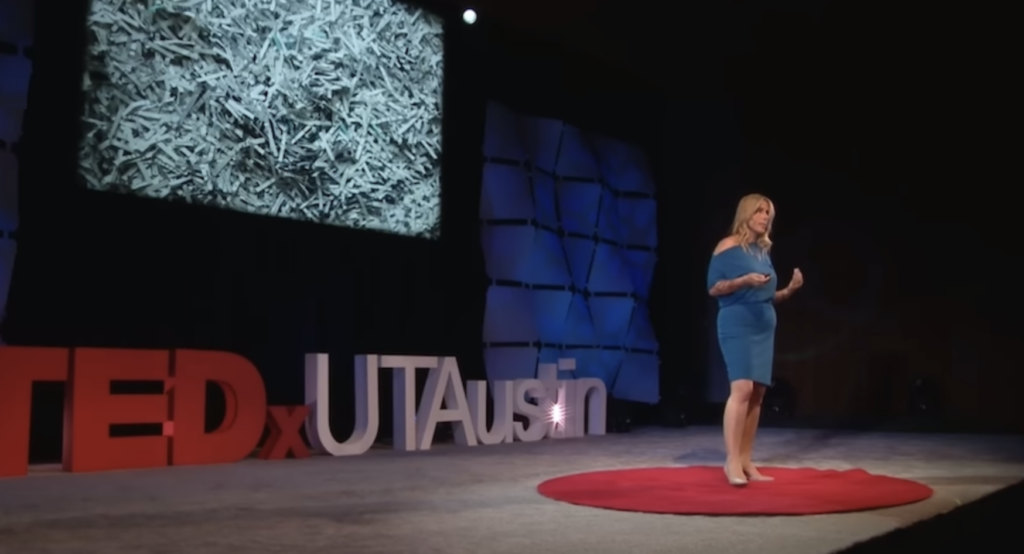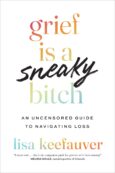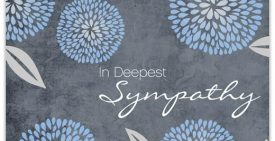
Lisa Keefauver gives her TEDx Talk, “Why Knowing More About Grief Can Make it Suck Less.” Watch it in full below.
It’s exam time!
Ugh, I know. Who likes exams? Nobody.
Yet, I think my Grief Beliefs Exam could not only ease any unnecessary suffering you’re experiencing, but it could also positively impact you now and generations of your family to come.
It sounds like I’m selling you something, but this test is totally free. There’s not even a co-pay. It requires only a bit of your time — as little as 15 minutes or as long as an hour or more. Oh, and did I mention there are no wrong answers? If you complete it, you’ve aced it. Really.
OK, but you may be asking, what are “grief beliefs”?

“Grief is a Sneaky Bitch” is out June 4, 2024.
As I explain in my forthcoming book, “Grief is a Sneaky Bitch: An Uncensored Guide to Navigating Loss,” we carry with us all manner of beliefs, conscious or unconscious, and that includes beliefs about how we grieve our losses.
Grief beliefs dictate our assumptions about how we’re supposed to feel, think, and behave in our grief. Remember, those ideas aren’t facts, and they’re certainly not neutral.
Many of our grief beliefs have disastrous consequences. And the more we buy into them, the more we believe them to be true. These false but familiar stories shape how we feel and experience ourselves in grief. Inevitably, we build a story that seems so true that we end up judging ourselves for it. For example, believing that grief only happens when someone close to you dies often means people don’t seek help when they are struggling with a prenatal loss or a catastrophic injury.
When these grief beliefs go unexamined, they burden us and can have real consequences for the people we pass them on to. We might, for example, deny a loved one’s right to grieve a loss, causing them to feel isolated. Unexamined grief beliefs shape our lives at the systemic level too, contributing to why we have limited, if any, bereavement leave policies in the workplace.
That’s why I designed a simple way to help you examine your grief beliefs. It’s a series of questions I’ve used over the past five-plus years with every guest on my podcast, the students in my Loss and Grief workshops, and as a social worker and grief guide with my individual grief clients.
Remember, there are no right or wrong answers — just useful information to identify your grief beliefs, which ones are serving you, and which ones are getting in the way of your grieving process.
As you reflect on the following questions, write as much as you can for each answer. Don’t edit, just let it flow.
1. What is your earliest memory of loss in childhood?
That might be the death of a person or a pet. It might also be a more ambiguous loss, such as a friend moving away, parental divorce, deployment, or serious illness.
2. How were the adults in your life behaving or speaking about the loss?
That might include explicit messages (e.g., “It’s okay to be sad” or “Don’t look so sad”) or behaviors (e.g., putting up pictures or taking them down). On the contrary, these messages and behaviors might be implicit (e.g., changing the subject every time the person’s name was brought up or never mentioning them). In that way, it can include things people said or did or, just as profoundly, things they didn’t do or say.
3. What lessons then do you think you learned about what grief “should” or “shouldn’t” look like?
This might include what you think it taught you about what grief should or shouldn’t feel like in your body or what feelings or thoughts are right or wrong to have. It can include ideas about who is allowed to grieve, who or what you can grieve over, or what are acceptable expressions and duration of grief.
4. Based on those lessons, how do you think the grief beliefs you learned impact the seasons of grief you’ve faced (or are currently facing) as an adult?
You might reflect on what benefits (if any) these beliefs offered you in feeling comforted or supported in your grief. Consider, too, what constraints some of your grief beliefs might have placed on your ability to be with your grief in a caring and compassionate way.
5. Having answered questions 1-4, what grief beliefs do you think still serve you as an adult, helping you move forward with your grief in a healthy way? Which beliefs might you want to work on letting go of?
You might ask yourself questions, such as: How would it feel to ditch this belief? What would I gain as a result of letting it go? What beliefs might I replace it with that could help ease my suffering?
Remember when I said that there were no wrong answers? That means there’s no scorecard either. But there is a way to decipher your results.
If your answers have you feeling down, or some sort of way that feels hard, I encourage you to pause and be with your feelings as they are. With mindful attention (and perhaps placing hands over your heart), bring curiosity and self-compassion to your experience.
Now that you have an idea of the harmful grief beliefs getting in your way — beliefs that, say, stop you from seeking professional help or even reaching out to a friend — you will start noticing them in action. You might overhear yourself saying things like, “My grief doesn’t matter” or “I shouldn’t complain because she has it worse.”
Or perhaps you begin to notice that you are constantly apologizing for crying or displaying emotion when the topic of your loved one comes up.
Don’t beat yourself up when you do. That’s your chance to replace or reframe your grief belief into something that allows you to move forward with more ease and grace. You might reframe “My grief doesn’t matter” with “All humans experience loss, which means we all have the right to grieve, including me.”
Oh, and don’t forget about noticing and reinforcing the beliefs that serve you well. If you find yourself feeling better or comforted after an encounter, make note of the belief that allowed you to get what you needed.
Remember, you’ve likely carried your grief beliefs for a long time. That means that even the beliefs you’re working to release may come creeping back in from time to time. That’s OK, it happens to all of us. One telltale sign that harmful grief beliefs are showing up again is when words like “should” and “shouldn’t” start creeping back into our thoughts and conversations.
That’s why, in my book, I encourage you to become a detective, investigating those pesky shoulds. For one day or, if you’re feeling ambitious, one week, I invite you to hone your detective skills by asking yourself questions about the phrase, the context in which it came up, how it made you feel, and whether the belief that surfaced is one you want to keep or want to ditch. As for those grief beliefs that don’t sit right with you, think about how you can reframe it so that it’s healing rather than harmful.
Lisa Keefauver is the host of the top-rated podcast “Grief Is a Sneaky Bitch” and the author of “Grief is a Sneaky Bitch: An Uncensored Guide to Navigating Loss,” out June 4, 2024. She is a social worker and widow who shares her wisdom, humor, and compassion as a keynote speaker, moderator, and consultant. Learn more at lisakeefauver.com.
Watch Lisa Keefauver’s popular TEDx Talk, “Why Knowing More About Grief Can Make it Suck Less”:









